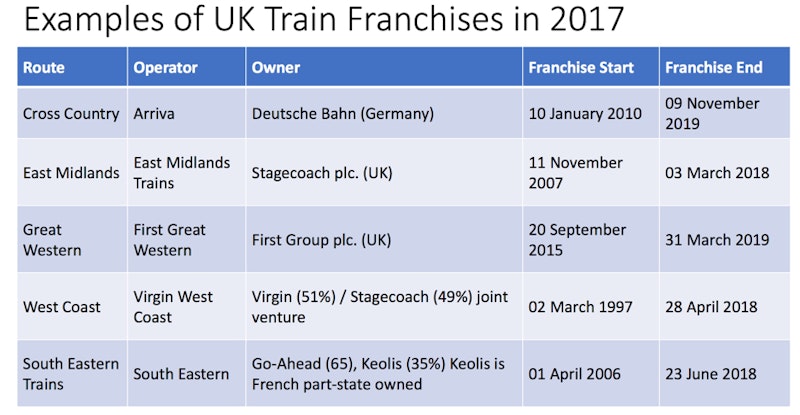Topic Videos
Economics of Rail Nationalisation
- Level:
- AS, A-Level, IB
- Board:
- AQA, Edexcel, OCR, IB, Eduqas, WJEC
Last updated 20 May 2018
This revision video assesses some of the arguments for and against taking the UK rail industry into state ownership.
John McDonnell (Labour Conference, September 2017)
"Building an economy for the many also means bringing ownership and control of the utilities and key services into the hands of people who use and work in them. Rail, water, energy, Royal Mail: we’re taking them back."
UK Rail Industry – Key Statistics (2016-17)
- Contributes £10bn per annum to GDP (gross value added)
- Employs 216,000 people (rail industry and supply chain)
- 3% passenger modal share
- 77% passenger satisfaction with punctuality
- £4.2 billion in government financial support (subsidy)
- 1.73 billion passenger journeys per year
- 48% of rail journeys cited for commuting
- Passenger income as a share of rail industry income has risen from 51% in 2010 to 71% in 2015

Broader issues in this debate over state v private
- A successful UK rail industry is needed to sustain and improve competitiveness / support tourism / regional economic balance
- UK rail network is expensive to run – in part a legacy from the Victorian age. Huge investment needs – unlikely that the private sector can provide sufficient funds
- Market failure issues are also important e.g. positive externalities from encouraging an increase in mass transport / reducing traffic congestion, affordable rail and geographical mobility of labour
- Much of the UK rail industry is already under state control / or direct regulation e.g. nearly half of fares, Government sets terms of franchises
- Affordability of rail travel is a major issue although dynamic pricing cuts fares for many segments of the market (e.g. student railcards)
You might also like
State Intervention – Growth and Development
Study Notes

Why did we sell off the railways?
17th May 2018
Why the East Coast rail franchise imploded
20th May 2018
Privatisation - 2021 Revision Update
Topic Videos

Energy Crisis - Germany nationalises energy giant Uniper
21st September 2022

Would households benefit from nationalisation of the energy sector?
25th September 2022

West Yorkshire nationalises bus services
14th March 2024
Daily Email Updates
Subscribe to our daily digest and get the day’s content delivered fresh to your inbox every morning at 7am.
Signup for emails